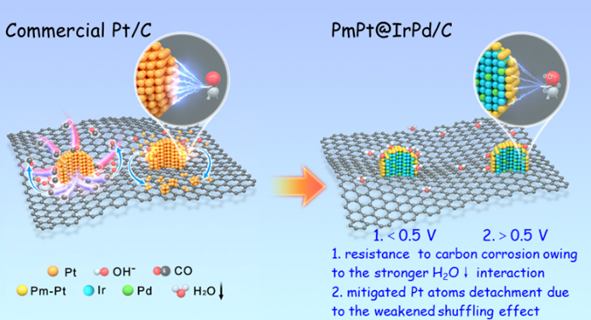Recently, the research group led by Prof. Wang Deli published their research work entitled "Pseudo-Pt Monolayer for Robust Hydrogen Oxidation" online on Journal of the American Chemical Society.
Heteroepitaxial core–shell structure is conducive to combining the advantages of the epilayer and the substrate, creating a novel multifunctionality for catalysis application. Herein, we report a pseudomorphic-Pt atomic layer (PmPt) epitaxially growing on an IrPd-core matrix (PmPt@IrPd/C) as an efficient and stable catalyst for alkaline hydrogen oxidation reaction that exhibits ∼29.2 times more mass activity enhancement than that of benchmark Pt/C. The PmPt@IrPd/C catalyst also gives rise to ∼25.0 times more enhancement than Pt/C during a 50,000-cycle accelerated stability test. This robust stability originates from the resistance to carbon corrosion owing to the stronger H2O interaction instead of carbon oxide (COx) poison species, and the modulated hydroxyl (OH*) adsorption could inhibit the OH* species from shuffling the surface Pt atoms away from the substrate. Moreover, the anion-exchange membrane fuel cells assembled by PmPt@IrPd/C with an ultralow Pt loading of 0.009 mgPt cm–2 in the anode can deliver a power density of 1.27 W cm–2.

Link to this paper: https://doi.org/10.1021/jacs.2c11907